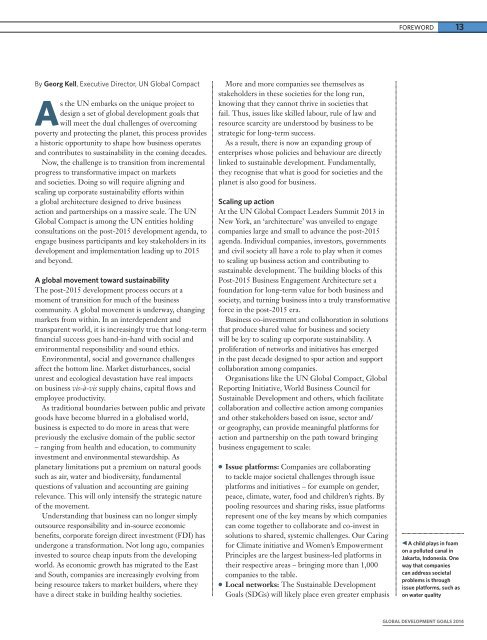FAMBB
FAMBB
FAMBB
Create successful ePaper yourself
Turn your PDF publications into a flip-book with our unique Google optimized e-Paper software.
FOREWORD13By Georg Kell, Executive Director, UN Global CompactAs the UN embarks on the unique project todesign a set of global development goals thatwill meet the dual challenges of overcomingpoverty and protecting the planet, this process providesa historic opportunity to shape how business operatesand contributes to sustainability in the coming decades.Now, the challenge is to transition from incrementalprogress to transformative impact on marketsand societies. Doing so will require aligning andscaling up corporate sustainability efforts withina global architecture designed to drive businessaction and partnerships on a massive scale. The UNGlobal Compact is among the UN entities holdingconsultations on the post-2015 development agenda, toengage business participants and key stakeholders in itsdevelopment and implementation leading up to 2015and beyond.A global movement toward sustainabilityThe post-2015 development process occurs at amoment of transition for much of the businesscommunity. A global movement is underway, changingmarkets from within. In an interdependent andtransparent world, it is increasingly true that long-termfinancial success goes hand-in-hand with social andenvironmental responsibility and sound ethics.Environmental, social and governance challengesaffect the bottom line. Market disturbances, socialunrest and ecological devastation have real impactson business vis-à-vis supply chains, capital flows andemployee productivity.As traditional boundaries between public and privategoods have become blurred in a globalised world,business is expected to do more in areas that werepreviously the exclusive domain of the public sector– ranging from health and education, to communityinvestment and environmental stewardship. Asplanetary limitations put a premium on natural goodssuch as air, water and biodiversity, fundamentalquestions of valuation and accounting are gainingrelevance. This will only intensify the strategic natureof the movement.Understanding that business can no longer simplyoutsource responsibility and in-source economicbenefits, corporate foreign direct investment (FDI) hasundergone a transformation. Not long ago, companiesinvested to source cheap inputs from the developingworld. As economic growth has migrated to the Eastand South, companies are increasingly evolving frombeing resource takers to market builders, where theyhave a direct stake in building healthy societies.More and more companies see themselves asstakeholders in these societies for the long run,knowing that they cannot thrive in societies thatfail. Thus, issues like skilled labour, rule of law andresource scarcity are understood by business to bestrategic for long-term success.As a result, there is now an expanding group ofenterprises whose policies and behaviour are directlylinked to sustainable development. Fundamentally,they recognise that what is good for societies and theplanet is also good for business.Scaling up actionAt the UN Global Compact Leaders Summit 2013 inNew York, an ‘architecture’ was unveiled to engagecompanies large and small to advance the post-2015agenda. Individual companies, investors, governmentsand civil society all have a role to play when it comesto scaling up business action and contributing tosustainable development. The building blocks of thisPost-2015 Business Engagement Architecture set afoundation for long-term value for both business andsociety, and turning business into a truly transformativeforce in the post-2015 era.Business co-investment and collaboration in solutionsthat produce shared value for business and societywill be key to scaling up corporate sustainability. Aproliferation of networks and initiatives has emergedin the past decade designed to spur action and supportcollaboration among companies.Organisations like the UN Global Compact, GlobalReporting Initiative, World Business Council forSustainable Development and others, which facilitatecollaboration and collective action among companiesand other stakeholders based on issue, sector and/or geography, can provide meaningful platforms foraction and partnership on the path toward bringingbusiness engagement to scale:●●Issue platforms: Companies are collaboratingto tackle major societal challenges through issueplatforms and initiatives – for example on gender,peace, climate, water, food and children’s rights. Bypooling resources and sharing risks, issue platformsrepresent one of the key means by which companiescan come together to collaborate and co-invest insolutions to shared, systemic challenges. Our Caringfor Climate initiative and Women’s EmpowermentPrinciples are the largest business-led platforms intheir respective areas – bringing more than 1,000companies to the table.●●Local networks: The Sustainable DevelopmentGoals (SDGs) will likely place even greater emphasisA child plays in foamon a polluted canal inJakarta, Indonesia. Oneway that companiescan address societalproblems is throughissue platforms, such ason water qualityGLOBAL DEVELOPMENT GOALS 2014


